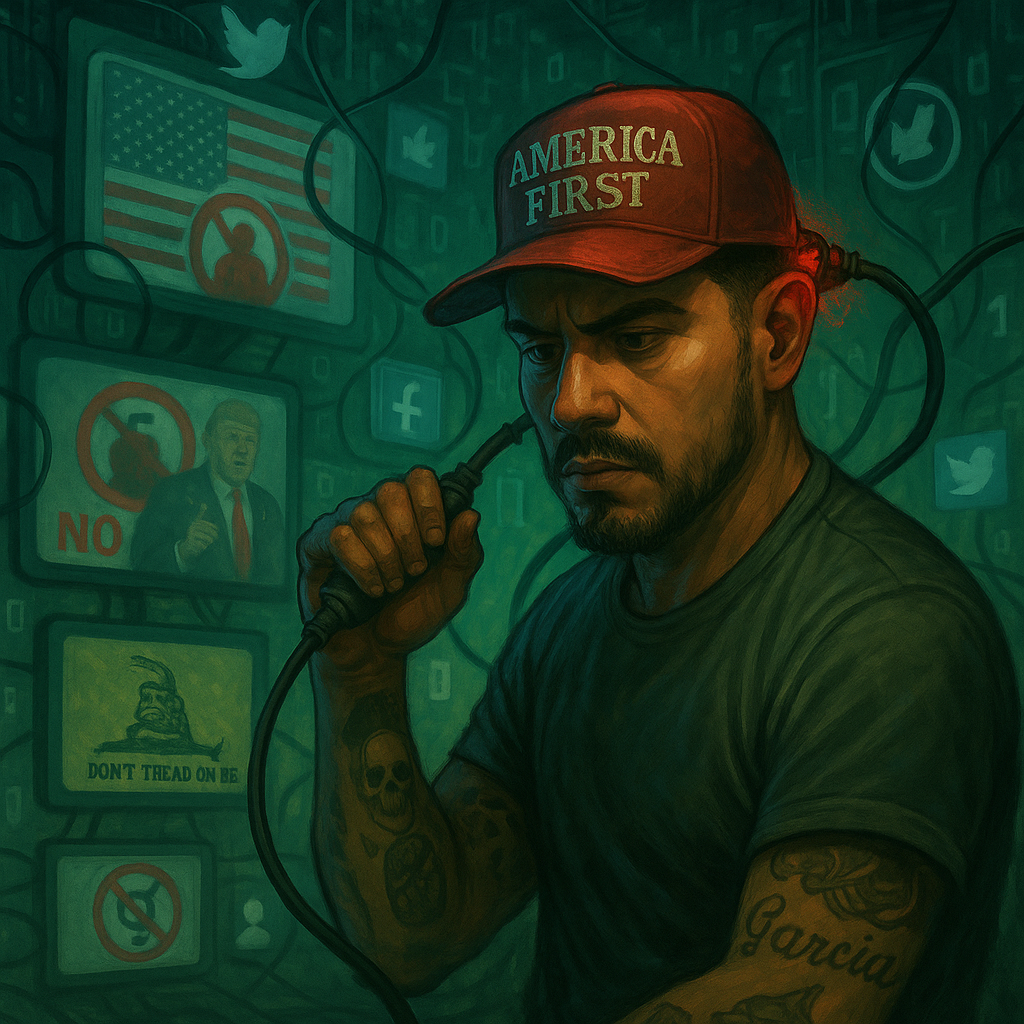The Man at the Border: A Parable of Belonging in the Age of Illusions

There was once a man named Daniel. He lived near the edge of a great, divided land. He believed himself to be a sentinel—standing tall for truth, for nation, for tradition. He wore symbols of the borderland on his truck, his clothing, even tattooed across his skin. He had grown up hearing stories of greatness—how his land was the last free place, the beacon of hope in a corrupted world. And so he chose his side: America First, loud and proud.
Daniel was not white, not Anglo. His grandparents spoke Spanish, their hands calloused from the fields. But Daniel had chosen to prove—over and over again—that he was part of the in-group, America first. He wasn't weak. He wasn't confused. He wasn’t a "liberal."
Every morning, he would log into his phone like a soldier checking the front lines. He scrolled through alerts, videos, outrage, betrayal. He shook his head at the "insanity" of the world: men in dresses, flags with too many colors, "degeneracy." He posted. He fought. He reminded the world—and himself—of where he stood.
But Daniel didn’t know he was inside a carefully designed simulation.
The system he hated—he believed he was resisting it. But what he didn’t see was this: it wanted him to react. Every video he watched, every comment he posted, every angry thought in his head—they were not his anymore. They were input/output, part of a feedback loop he never volunteered for, but never unplugged from either.
One night, Daniel had a dream.
He was at the border—but not of a country. It was a border between two realities.
On one side, everything was familiar. There were memes. Flags. Tucker. Trump. The "libs" being owned again and again. But something felt... off. Like a TV set you’ve seen behind the scenes. He realized: none of the people in this world ever touched the real problems—housing, wages, mental health, loneliness, war profiteering. They only talked about symbols.
On the other side of the border was silence.
No memes. No fights. Just people—different colors, different lives—working, laughing, crying, arguing. It wasn't utopia, but it was real. No algorithm filtered it. No ideology repackaged it. It wasn’t Left or Right. It was just life.
Daniel tried to cross. But guards stood at the border—guards wearing all the same symbols he did. American flags. Proud Boy tattoos. 2A shirts. And they said:
“You don’t belong over there. That’s for traitors. That’s for weak men.”
Daniel hesitated. He looked back. He realized something terrifying: he didn’t belong anywhere. The very people he thought he stood with—they saw his skin first. His name: Garcia. His inked arms. If something happened, if the storm came, they’d turn on him just as fast.
He woke up. Cold sweat.
The next day, Daniel didn’t rip the bumper stickers off. He didn’t burn his hat. But he did one thing: he logged off.
For a week. Then two.
And a strange thing happened. His mind got quieter. He saw people—not threats. Conversations—not propaganda. His body softened. His rage didn’t go away, but it became clearer. More human.
He wasn’t betrayed by the "libs." He was betrayed by the game itself.
Daniel still believed in strength. In family. In meaning. But now he knew: real strength isn’t screaming at a screen. It’s asking who wrote the script I’ve been performing?
He didn’t need to become a Leftist. Or wave a rainbow flag. That was just another binary.
He needed to become free.
Moral:
When your whole identity is forged in opposition, you're still letting the other side define you. The matrix doesn’t care what side you're on—only that you stay plugged in. If you want to fight for something real, you first have to unplug from the illusion. You are not your ideology. You are more than their war wants you to be.

Member discussion